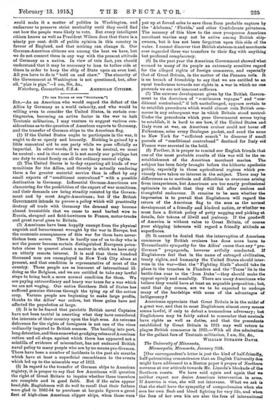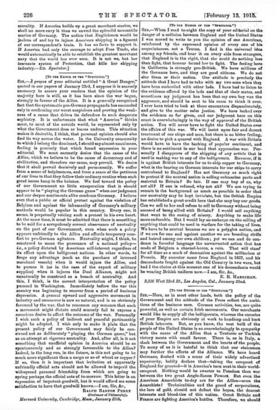[To TA. Enna or ran "Sr.-1.'0.n SIR, —As an American who
would regard the defeat of the Allies by Germany as a world calamity, and who would be willing even to consider the United States, in certain con- tingencies, becoming an active factor in the war to halt Teutonic militarism. I may venture to suggest various con- siderations as to the question of American exports to Germany, and the transfer of German ships to the American flag.
(1) If the United States ought to participate in the war, it ought to do so openly and honestly. Nothing is gained by a little urmentral aid to one party while we pose officially as impartial. In other words, if we are to be neutral, we must be neutral : and in that case it is not merely our privilege but our duty to stand firmly on all the ordinary neutral rights.
(2) The United States is to-day exporting all kinds of war munitions for the Allies, and thereby is actually rendering them a far greater material service than is offset by any small exports of "conditional contraband" with a possible destination in Germany. Influential German-Americans are clamouring for the prohibition of the export of war munitions, and their demands are being steadily resisted by the Govern- ment and by most Anglo-Americans; but if the British Government intends to pursue a policy which will practically destroy all trade with Germany the demand may become almost irresistible that we cease to send barbed wire to Russia, shrapnel and field-howitzers to France, motor-tracks and great naval guns to Britain.
(3) Americans have been happily exempt from the physical anguish and bereavement wrought by the war in Europe, but the economic consequences of this war for them have never- theless been severe. There is hardly one of us to-day who is not the poorer because certain distinguished European poten- tates chose to quarrel about a matter in which we have only an utterly remote interest. It is said that three hundred thousand men are unemployed in New York City alone at present, and that condition is representative of most of the country. These people are as innocent of international ill- doing as the Belgians, and we are entitled to take any lawful steps to bring back a more normal condition for them. We are paying extraordinary and heavy war taxes for a war which we are not waging. Our entire Southern Belt of States has suffered genuine distress through the tying up of the cotton crop. Various people are beginning to make large profits, thanks to the Allies' war orders, but these gains have not affected the population at large.
(4) It is to be feared that patriotic British naval Captains have not been tactful in asserting what they have considered the interests of their country upon the high seas. An extreme deference for the rights of foreigners is not one of the vices ordinarily imputed to British seamen. The hauling into port, long detention, and thensomewhat grudging release of A meriean cotton and oil ships, against which there has appeared not a scintilla of evidence of misconduct, has not endeared British naval policy to many people who are by no means pro-German. There have been a number of incidents in the past six months which have at least a superficial resemblance to the events which led up to the miserable war of 1812.
(6) In regard to the transfer of German ships to American registry, it is proper to any that few Americans will question the right of Great Britain to inquire whether these transfers are complete and in good faith. But if the sales appear bond-fide, Englishmen will do well to recall that their fathers were glad in 1862.64 to purchase at bargain figures a great fleet of high-class American clipper ships, when these were put up at forced sales to save them from probable capture by the ' Alabama,' 'Florida,' and other Confederate privateers. The memory of this blow to the once prosperous American merchant marine may not be active among British ship- owners, but it has not been forgotten upon this side of the water. I cannot discover that British statesmen and merchants ever regarded these war transfers to their flag with anything but profound complacency.
(6) In the past year the American Government showed what seemed to many of its people an extremely sensitive regard for the alleged rights of foreign commerce, and especially that of Great Britain, in the matter of the Panama tolls. It is no breach of friendship to say that we are entitled to an equal tenderness towards our rights in a war in which no one pretends we are not innocent sufferers.
(7) The extreme development given by the British Govern. ment to the doctrines of "continuous voyages" and "oar ditional contraband," if left unchallenged, appears certain to to establish precedents which would almost ruin British com- merce in any subsequent war in which Britain stood neutral- Under the precedents which your Government seems trying to establish, it is hard to see how, if the United States and Italy were at war, an American cruiser could not hover off Folkestone, seize every Boulogne packet, and send the same to New York for "sufficient search" to discover if small parcels of "conditional contraband" destined for Italy rid France were secreted in the hold.
(8) Further, it is proper to remind our English friends that one of the most probable results of this war will be the re- establishment of the American merchant marine. The subject has been fairly brought before the hitherto apathetic public, especially in those agricultural regions which pre- viously have taken no interest in the subject. There may he differences as to methods and difficulties to overcome arising from inexperience, but Americans are too nearly professional optimists to admit that they will fail after zealous and thoughtful endeavour. It remains to be seen whether the impression is to prevail that Englishmen will regard the return of the American flag to the seas as the normal development of a friendly and kindred nation, or whether we must face a British policy of petty nagging and picking at details, fair tokens of illwill and jealousy. If the goodwill of America is without value to Great Britain, of course your shipping interests will regard a friendly attitude se superfluous.
(9) It cannot be denied that the interruption of Americas commerce by British cruisers has done more harm to Transatlantic sympathy for the Allies cause than any " pro- German " propaganda, however artfully conducted. If Englishmen feel that in the Dame of outraged civilization, treaty rights, and humanity the United States should inter. vene in the war—that the "Fighting Sixth" should take its place in the trenches in Flanders and the ' Texas' lie in the battle-line near to the ' Iron Duke '—they should make the appeal openly and manfully. There are many Americans who believe they would have at least an arguable proposition; but, until that day comes, are we to be expected to undergo many of the hardships with none of the advantages of belligerency ?
Americans appreciate that Great Britain is in the midst of a great war, and that to most Englishmen almost every means seems lawful, if only to defeat a tremendous adversary; but Englishmen may be fairly asked to remember that neutrals have rights as well as duties, and that the precedents established by Great Britain in 1915 may well return to plague British commerce in 1925.—With all due admiration for the gallant foes of Teutonic militarism, I am, Sir, &o., WILLIAM STEA.RN8 DAYLL The University of Minnesota, Minneapolis, Minnesota, January 25111.
[Our correspondent's letter is just the kind of half-friendly half-patronizing remonstrance that an English University dos might have addressed to a Boston paper &propos of Northern soreness at our attitude towards Mr. Lincoln's blockade of the Southern coasts. We have said again and again that we neither expect nor desire American intervention in arms. If America is wise, she will not intervene. What we ask is that she shall have the sympathy of comprehension when she sees her own flesh and blood fighting for very life, and when the foes of her own kin are also the foes of international
Morality. If America builds up a great merchant marine, we shall no more envy it than we envied the splendid mercantile marine of Germany. The notion that Englishmen world be jealous of and try to injure American shipping is a figment of our correspondent's brain. It has no facts to eupport it. If America had only the courage to adopt Free Trade, she would automatically be able to establish the greatest merchant navy that the world bee ever seen. It is not we, but her insensate system of Protection, that kills her shipping industry.—En. Spectator.]







































 Previous page
Previous page